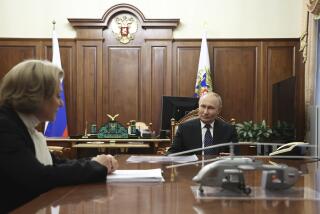Russia lawmakers: Recall ambassador to U.S., send troops to Ukraine
- Share via
MOSCOW – Russian lawmakers unanimously approved a request by President Vladimir Putin to send armed forces to Ukraine to protect ethnic Russians there and secure the Black Sea fleet and other military installations in Ukraine’s Crimea region.
In a 90-0 vote during an extraordinary session of the Federation Council, the upper house deputies argued that last week’s disruption of “constitutional order,” the deadly confrontation in Kiev that led then-President Viktor Yanukovich to flee to Russia, exposes Ukraine’s minority Russian-speaking community to unspecified dangers.
The Federation Council also recommended that the Kremlin recall the Russian ambassador to the United States to underscore objections to remarks made by President Obama on Friday. At a White House briefing, Obama warned Putin that he was “deeply concerned” by the reported Russian military maneuvers in Crimea, which are considered by the West to be in violation of Russia’s post-Soviet agreement with Ukraine for maintaining its naval base in the leased city of Sevastopol. Obama said there would be “consequences” for the Kremlin should it interfere in Ukraine’s political crisis.
“The president will consider the appeal and make a decision,” Federation Council President Valentina Matvienko told reporters after the televised upper house session, referring to the council’s recommendation that Russia’s ambassador be recalled to Moscow in protest.
The authorization of military intervention came in response to an appeal by Crimea’s newly installed, pro-Moscow government chief, Sergei Aksenov, for assistance from Russia to “normalize” the social order in Crimea.
Aksenov emerged as leader of the so-called autonomous republic of Crimea on Thursday at a legislative session in Simferopol, the regional capital, conducted while the assembly building was occupied by heavily armed and masked gunmen. On Saturday, Aksenov declared himself to be commander of all armed forces and police in the region, in a direct challenge of the authority of new government leaders in Kiev, Ukraine’s capital.
Putin then turned to the Federation Council for authorization to use Russian forces in Ukraine, claiming a constitutional provision – Article 102, Chapter 1, Point G – “until there is a normalization of the social-political conditions in the country.”
The authorization of troop deployments to “the territory of Ukraine” appeared to give broad approval for the Kremlin to respond to any perceived threat to Russians in the neighboring former Soviet republic.
Until Saturday, demonstrative rejection of the new interim government in Kiev had been focused on Crimea, where the highest concentration of Russians in Ukraine live and work. However, fresh outbreaks of opposition to the Ukrainian leadership were reported Saturday in Donetsk, Kharkiv and Odessa, where Russian troops could also now be sent, according to the legislative action.
The authorization for Russian troop deployments to Ukraine followed ominous military moves in Crimea over the last two days. Masked gunmen in military fatigues took over the regional parliament and government headquarters Thursday, and Russian military forces were reported to have arrived by the hundreds and possibly thousands on Friday to the Gvardeyskoye military airstrip near Simferopol.
Acting Ukrainian Prime Minister Arseny Yatsenyuk convened his Cabinet on Saturday to discuss the unraveling situation in the east and south of the country.
“We call on the government and authorities of Russia to recall their forces, and to return them to their stations,” Yatsenyuk said, according to the Interfax news agency. “Russian partners, stop provoking civil and military resistance in Ukraine.”
Oleksandr Turchynov, named acting Ukrainian president by the victorious political forces who drove Yanukovich from power last week, called the Russian military operations in Crimea “naked aggression.” He also rejected Aksenov’s emergence as Crimean prime minister as “illegitimate.”
Twitter: @cjwilliamslat
More to Read
Sign up for Essential California
The most important California stories and recommendations in your inbox every morning.
You may occasionally receive promotional content from the Los Angeles Times.











